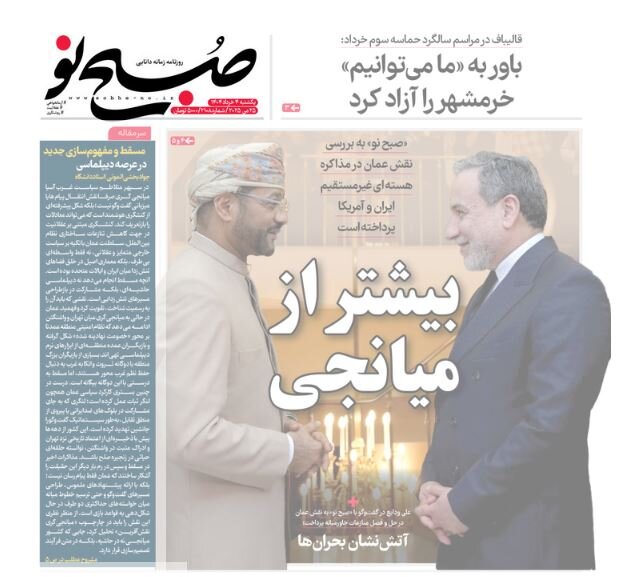Tehran-Sobh-e-no challenged the fifth round of talks between Iran and the United States in Rome on Friday.
It writes as follows: Although discussions were held for the fifth round, serious differences and unsolved US statements regarding the complete suspension of Iran’s enrichment programme challenged the atmosphere of the talks and significantly undermined the possibility of holding the round. However, the Omani Foreign Minister pushed both sides back to the negotiation table and continue indirect discussions. This series of consultations has once again shown that the path to reaching a final agreement remains challenging and long, and that the role of mediators, particularly Oman, is key to maintaining the channel of communication between Tehran and Washington. An important point to note is the published report on Witkov and long meetings with the head of the Israeli spy agency Mossad. The conference presents coordination and consultations between the US and Israel over nuclear negotiations. Given the prominent role of the Netanyahu government in putting pressure on Zionist lobbies and Washington, such a conference could have an impact on US policy in negotiations.
Resalat: Enrichment is an inherent right of Iran
In the analysis, Resalat addressed the prerequisite for negotiations: “zero percent enrichment” raised by the US side. It is clear that the US claim that this paper crosses this red line leads to a failure of negotiations and agreements, in principle. In this regard, there are important legal and technical points that cannot be ignored. Industrial-scale uranium enrichment is considered not a “privilege” but a “intrinsic right” of NPT members. Western politicians and the media are trying to present a false and incomplete interpretation of this right, and believe it is “acquired and abandoned” at best. Therefore, American officials should not waste Iran’s nuclear negotiation team’s time at the negotiation table if they do not want to understand this legal and fundamental right. The roadmap for the true agreement was drawn by diplomats of our nation in Muscat and Roman talks. Washington has no choice but to adhere to the bold and unwavering principles and lines painted by the Iranian state.
Arman-e-Emrooz: The prominent role of Oman in negotiations
Arman-E-Emrooz commented on Oman’s important role in keeping the door open for nuclear negotiations between Tehran and Washington. It writes: The turning point for the fifth round of negotiations appears to be the solution proposed by Oman for the enrichment problem. The proposal proposed by Oman is likely related to a signal that Russian officials sent it the day before negotiations. Alexander Vendictov, deputy secretary of the Russian Security Council, announced that Moscow is ready to play a role in negotiations between Tehran and Washington over Iran’s nuclear program. This stance brings speculation to the reality that Iran’s extremely rich uranium will likely be transferred to Russia and that Iran will continue to enrich uranium at a low level with participation in Russia or other countries, perhaps under Russian or American supervision. The actors in this process are undoubtedly Russia, Oman, Qatar and perhaps Japan, with the aim of establishing an agreement between Iran and the US with a central solution and taking collective action to resolve the enrichment problem. Meanwhile, it is also possible that Iran temporarily suspends enrichment within the country to build confidence and resume it with the participation of trustworthy partners.
Ham Mihan: Healthy Competition
In his explanation, Ham Mihan dealt with improved relations between Tehran and Riyadh and their healthy competition. It writes as follows: Geopolitical orders and political situations in both countries in recent years appear to have been decided by Iran and Saudi Arabia to alleviate tensions. The geopolitical differences between Iran and Saudi Arabia do not appear to have been resolved in the regions and countries they compete with. Alliance groups of Iran and Saudi Arabia still compete with each other in sensitive regions of the region. However, by reducing tension, the competition appears to take a healthier course and become less tense. The evidence shows that leaders of both countries asked local alliance groups to avoid violent conflict with each other. At the same time, several other developments in the region have temporarily remained silent due to the collateral damages of the Gaza War.

